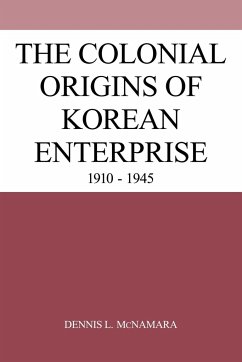This book provides a detailed picture of indigenous capitalism during Japanese colonization of Korea.
South Korean conglomerates, or 'chaebol,' such as Hyundai and Samsung, play a far more important role in the Korean economy than do comparable large firms in the US and Japanese economies. Despite the importance of the chaebol to the rapid postwar development of the Korean economy, little has been written about their origins during the Japanese occupation. Through case studies of local ownership in major financial, commercial, and industrial ventures, this book provides a detailed picture of indigenous capitalism during Japanese colonization. Drawing on Japanese government sources, Korean biographies and diaries, interviews and US intelligence material, the author gives a compelling account of key personalities in the Korean business elite and of the personal dilemmas of balancing nationalism against success under dependent, colonial conditions. The author concludes that dependent rather than comprador capitalism characterized leading Korean businesses through 1945. Patterns of concentration within family enterprises, close ties with the colonial state, and mutual support among a Korean inner circle of business leaders constitute a legacy of the colonial period important to the subsequent development of Korean conglomerates.
Review quote:
"...McNamara makes the case that Korea's post-1965 economic success and its politial economy is inexplicable without understanding the colonial legacy. This argument is a corrective to the existing literature on colonialism in Korea, and his case studies have much to contribute to the study of colonial history."
Meredith Woo-Cumings, Journal of Asian and African Studies
"This well-written study examines the experience of capitalism in the Republic of Korea during the years of Japan's colonial rule.... This study is a useful addition to growing literature that attempts to analyze factors contributing to strong economic growth in South Korea during the last two decades."
J. S. Uppal, SUNY at Albany, in Choice
"Dennis McNamara's book is a welcome addition to the history of countries that have had to industrialize without even their leading enterprises benefitting from the competitive asset of pioneering products and processes."
Alice H. Amsden, Business History Review
"...a well-organized account of the constraints the Japanese placed on Korean entrepreneurs...."
Kenneth M. Wells, Journal of Asian History
Table of contents:
Preface; Abbreviations; 1. Origins; 2. Benign capitalism; 3. Colonial state; 4. Japanese investment; 5. The mins and finance; 6. Pak and commerce; 7. Kim and industry; 8. Legacies; Notes; Appendices; Bibliography; Index.
South Korean conglomerates, or 'chaebol,' such as Hyundai and Samsung, play a far more important role in the Korean economy than do comparable large firms in the US and Japanese economies. Despite the importance of the chaebol to the rapid postwar development of the Korean economy, little has been written about their origins during the Japanese occupation. Through case studies of local ownership in major financial, commercial, and industrial ventures, this book provides a detailed picture of indigenous capitalism during Japanese colonization. Drawing on Japanese government sources, Korean biographies and diaries, interviews and US intelligence material, the author gives a compelling account of key personalities in the Korean business elite and of the personal dilemmas of balancing nationalism against success under dependent, colonial conditions. The author concludes that dependent rather than comprador capitalism characterized leading Korean businesses through 1945. Patterns of concentration within family enterprises, close ties with the colonial state, and mutual support among a Korean inner circle of business leaders constitute a legacy of the colonial period important to the subsequent development of Korean conglomerates.
Review quote:
"...McNamara makes the case that Korea's post-1965 economic success and its politial economy is inexplicable without understanding the colonial legacy. This argument is a corrective to the existing literature on colonialism in Korea, and his case studies have much to contribute to the study of colonial history."
Meredith Woo-Cumings, Journal of Asian and African Studies
"This well-written study examines the experience of capitalism in the Republic of Korea during the years of Japan's colonial rule.... This study is a useful addition to growing literature that attempts to analyze factors contributing to strong economic growth in South Korea during the last two decades."
J. S. Uppal, SUNY at Albany, in Choice
"Dennis McNamara's book is a welcome addition to the history of countries that have had to industrialize without even their leading enterprises benefitting from the competitive asset of pioneering products and processes."
Alice H. Amsden, Business History Review
"...a well-organized account of the constraints the Japanese placed on Korean entrepreneurs...."
Kenneth M. Wells, Journal of Asian History
Table of contents:
Preface; Abbreviations; 1. Origins; 2. Benign capitalism; 3. Colonial state; 4. Japanese investment; 5. The mins and finance; 6. Pak and commerce; 7. Kim and industry; 8. Legacies; Notes; Appendices; Bibliography; Index.








